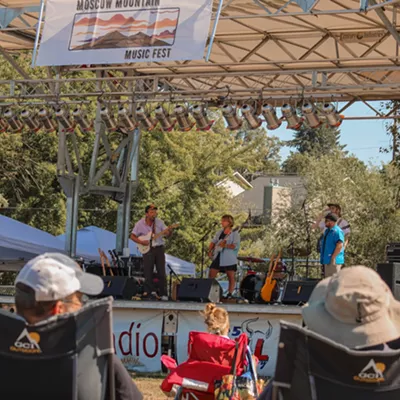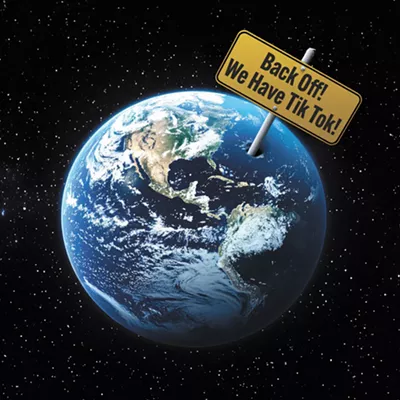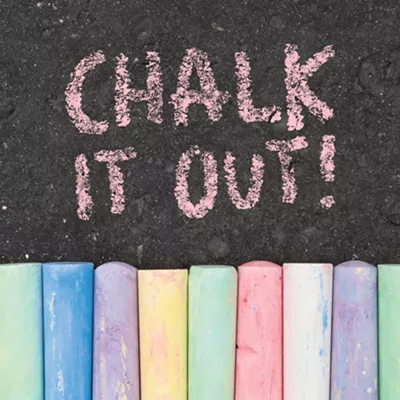
At a community Thanksgiving lunch, I glanced across the room and saw a young woman sit next to my children. A college student, I assumed, stuck in Moscow during a painful and bizarre fall break, perhaps finding some comfort in a free meal and a table with two sweet-faced middle-schoolers amid a sea of strangers.
When I sat down and introduced myself, she responded that she wasn't a student. She was a staffer at a media organization. One that I despise.
I'd spent the days since the murders of four University of Idaho students in the same state of raw shock as everyone else in Moscow. Far too often, I dealt with that shock by staring into the maw of social media, especially Twitter — where I track mentions of the university on TweetDeck, just for fun. Usually it's a nice way to spot interesting research or students in the news. For the past few weeks, it's been a horror show of speculations, accusations and lurid "news" stories — including those written by this young woman's colleagues.
"Oh, that's interesting," I said. "I'm a journalism instructor."
Usually I introduce myself as a freelance writer, part-time teacher. At a community event like the lunch, I might have mentioned my church or my spot on the city's human rights commission. But "journalism instructor," I said, forcing a smile.
This semester I'm teaching an introductory media writing class. The week after Thanksgiving was scheduled as a discussion of media ethics. I was planning, if my students were up for it, to discuss media coverage of the murders — the good, the bad and the ugly. I knew pieces by this young woman's organization would be among the latter.
But when I said "journalism instructor," she lit up. As we talked, I started seeing someone not too far removed from the student I'd assumed she was. Someone in the same stage as my former students, recent U of I grads, who had been covering the murders for Idaho news orgs.
She talked about how happy she was when a city official invited her to the lunch, and how welcoming everyone in Moscow is. I told her how upset people in town had been by some of the national news coverage, and she said she'd been upset by headlines and photos her organization had run, too.
I wanted to shout at her. Why didn't you do anything about it, then? But I didn't know she hadn't. And if she hadn't, how could I know why? She is a young person still feeling her way into an industry that is often exhausting and always complicated. I didn't know why she works where she does. But I knew she seemed to trust me. She offered to connect my students with internships. She confided how her week in Moscow had made her want to shift her career path, to do more reporting. When we said goodbye at the end of the meal, my smile was genuine.
In class the week after Thanksgiving, my students and I talked about the 24/7 news culture we've created in America — a monster that feeds on fear and misery that readers and viewers have convinced ourselves we can't look away from or live without. My students expressed their anger and confusion, and how being the center of national media attention had added to their grief. They talked about how much it hurts when pundits and armchair detectives treat Moscow like it's not a real place, the people here like we're not real.
My students talked, too, about how much they appreciated the reporters who cared, who wrote and broadcasted stories that shared important information while respecting the humanity of Xana, Ethan, Kaylee and Madison, their families and our community.
I mentioned the young woman at Thanksgiving and how I hoped she'd speak up to her bosses. But I didn't tell my students how I'd failed to live up to my own ethical standards in that moment I introduced myself. Despite my core belief that every human deserves grace, my first thought was, She's one of the bad ones, and she should know I think so.
They talked about how much it hurts when pundits and armchair detectives treat Moscow like it's not a real place, the people here like we're not real.
I've spent the semester telling my students I don't know how to fix "the media," as a mass. But I try to influence who they'll be as individuals within it. The people making unethical media decisions aren't usually cartoon villains twirling their mustaches, but ordinary people who are pressed into a corner by frantic deadlines, broken systems, lack of training and circumstances they can't control. I tell my students that they will face moments when they have to put their beliefs into action, and they may find this much, much harder than they think.
Though I don't know her whole story, I'm grateful that the young woman who sat down with my kids at Thanksgiving — this stranger in my town, this person I initially responded to with self-righteous anger — reminded me of the complexity not only of the media, but of life in general. It's so easy to rush to judgment, whether about a news story or a person, and so damaging. Repairing the damage takes patience, conversation and community.
This might feel overwhelming, I said to my students at the end of our ethics discussion, and you might wonder how you're supposed to remember it all. If nothing else, remember this: This is complex. But you don't have to do it alone. ♦
Tara Roberts is a writer and educator who lives in Moscow with her husband, sons and poodle. Her novel Wild and Distant Seas is forthcoming from Norton in 2024. Follow her on Twitter @tarabethidaho.





















